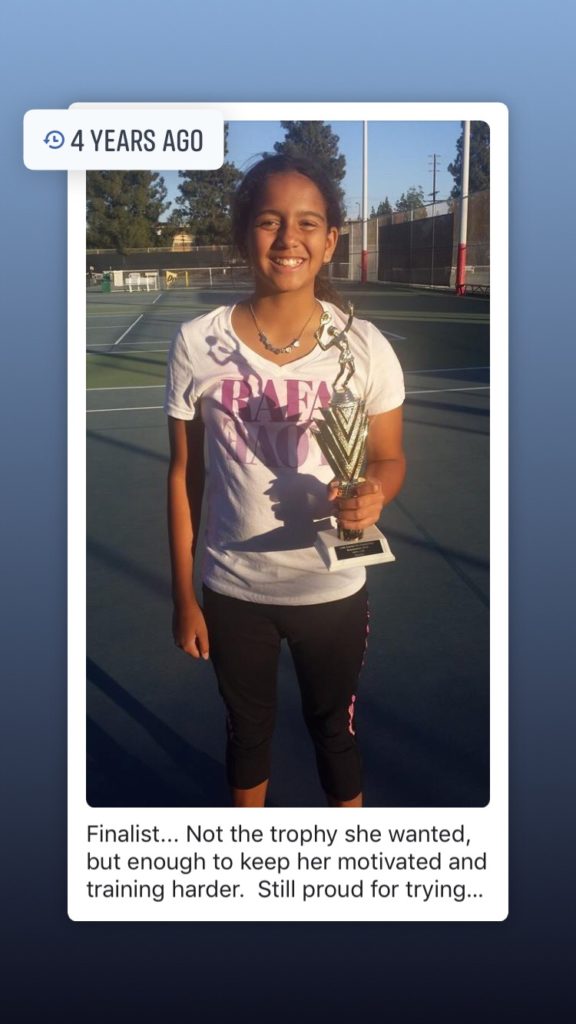
What Does Bianca Andreescu’s Mom Know That I Don’t?
By Cindy Matta
When 19-year old Bianca Andreescu took down the greatest women’s tennis player in history, Serena Williams in straight sets, the world became obsessed with Bianca’s mom. With her huge glasses, designer clothes, and consistently stoic look, she was definitely not the typical sports parent we’ve seen on television. You know the ones, wearing tee-shirts boasting their child’s name and bending and writhing with every hit and miss. Rather she seemed calm, cool and often distant at times. Even as the clearly pro-Serena crowd cheered on a mini-comeback, the camera kept showing Maria. Still nothing, zero emotion.
But this didn’t fool me. You see, I’m a tennis Mom and I know where she’s been and what she’s been through.
Bianca’s Instagram posts stated her mom is ‘the coolest person on the planet’ and how she learned meditation practices from her mom. Was it possible her mom figured this whole thing out, does she know something we don’t? I couldn’t help but wonder, how many times a hairbrush was launched across the room in frustration — a racquet thrown in anger? How many mother-daughter meltdowns were there? How did they handle the injuries, the long losing stretches, tantrums, growth-spurts, coaching changes, ridiculously long drives to practices, body issues, nasty opponents and angry parents, cheaters, bad line calls, defaults for sleeping in — and tears, tears and more tears?
I was one of those moms you all hate – Read Here
If you’ve ever watched a tennis match, no one seems happy — until the end when the winning player collapses on the court and kisses the ground — relieved. In a recent Elle magazine article, a reference was made to a photo of Serena’s box where everyone looked dismal as if they were attending a trial or a funeral. Even as a spectator we feel the tension on court and take that bumpy ride to victory or defeat. That’s the thing about tennis – even the finalist is a loser.
The junior circuit goes one step further. They hold matches all year around – On. Every. Major. Holiday.
The professional tennis season spans an entire calendar year when most sports have one season, but the junior circuit goes one step further. They hold matches all year around – On. Every. Major. Holiday. There’s the So Cal Christmas tournament, Easter Bowl, Mother’s Day, Memorial Day and … Nike wasn’t joking in a recent ad campaign when they stated, “There are NO days off.”
Despite the countless hours, our young players shoot for the moon hoping to land somewhere among the D1 Universities. When my daughter was starting in the 10’s… I was told that “If I socked away all the tennis money into a university fund, I wouldn’t have to worry about the free college… and she could have the freedom to choose where she wants to go, not wait to be chosen.”
Are you a sports parent hypocrite – like me? Read Here
And yet still knowing how impossibly hard a tennis life can be, thousands of parents, myself included — encourage their children every day to participate in a game that clearly sets them up for failure. The only way to gage success is by a ranking system or the new UTR (Universal Tennis Rating), which has created more teen angst than a missed party captured on Snapchat. Junior players will default from a match if playing a certain opponent could have the potential to lower their UTR. And, it seems a 10-year-old with an 11 UTR is supposed to have a competitive match with a D1 College Freshman with an 11 UTR? No way. Let’s say you happen to have a bad day, you’re competing with an injury, or you just want to try something new? You can count on UTR to remind you how awful you played, because they even email you your score from the previous weekend. As if seeing your result on the giant, plastic-numbered scorecards in front of all your peers isn’t bad enough, we need to be reminded that last weekend ended on a losing note.
College coaches like the UTR because it weeds out a bunch of kids fast – but crushes the hearts and souls of the late bloomers. Today, parents talk about UTR so much that one mom scouts the UTRs of the high school opponents, so she can make lineup suggestions to the head coach. That same mom’s kid chews her fingers until they bleed when the going gets tough. Last week, I saw a mother berate her child in front of an entire team of players and parents
What is all this displaced parental control and anger doing to our children? Does it make them better players or better people? If the pros lose and hit balls out, how can you expect a junior to keep it in? The pressure put on our tennis children to succeed is mind-numbing. And despite the agony of defeat, I wonder what the Gauff’s and Andreescus’ have done to cement their children’s success at such an early age? What can they teach us, tennis parents – about the process or the path to greatness?
Still, with the deck stacked against my girl and the odds not in her favor – why do I allow her to forge ahead slamming into a tennis wall that never misses? Maybe it’s because she believes there’s a silver-lining or golden pot of tennis balls on the other side of that rainbow net, so who am I to rain-out her game. As I’ve watched her grow through the age divisions, it seems the reward is in the journey, itself – not the big, fat checks and silver trophies — but chips added to the karma bank of resiliency, humility and appreciation. So, Instead of comparing her to the pros or her peers, I can laud her efforts knowing that there’s always a Seven-Eleven with Slurpee machine waiting — because at the end of the day, win or lose — I still love to watch her play.
Cindy Matta is a self-proclaimed trophy mom with an MFA in Screenwriting,
single-handedly raising a 6’1” lefty daughter in the So Cal “Tennis Village.”














